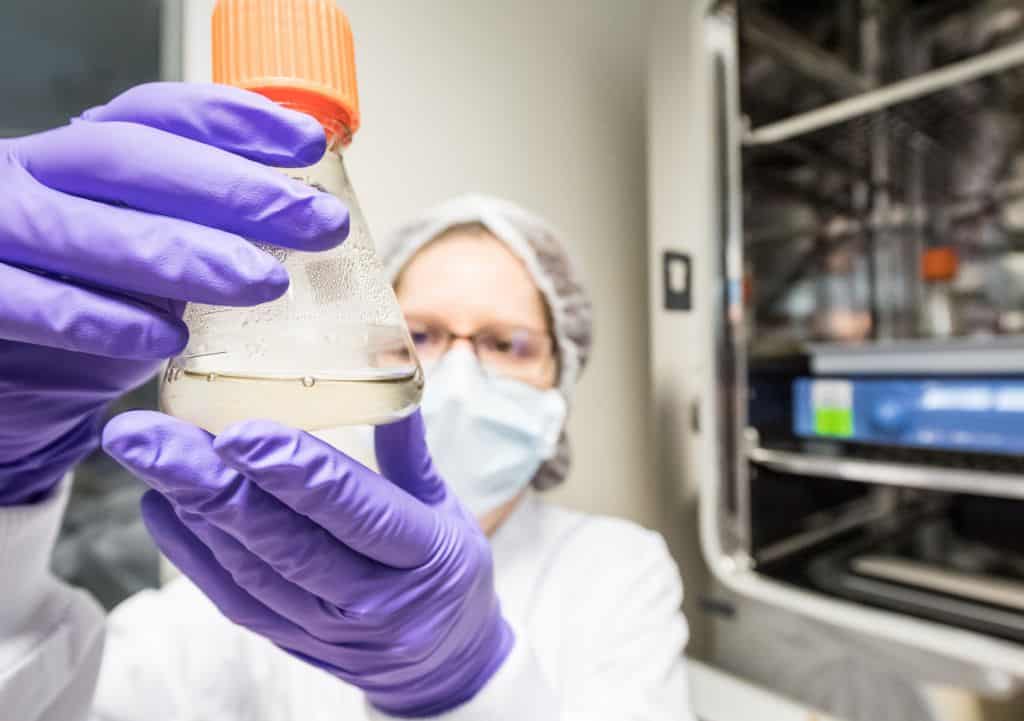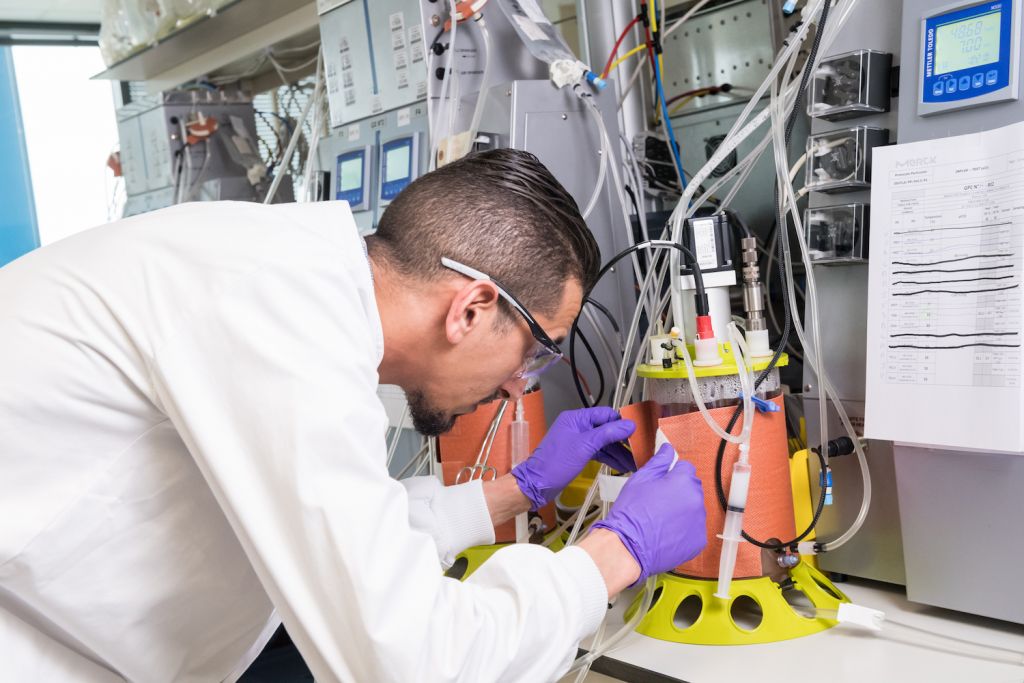Biotech firms partner with contract development and manufacturing organizations (CDMOs) to leverage their expertise in process development, optimization, and scale-up. In this article, we share an exclusive sneak-peek into a recent survey, which explores the main reasons why biotech companies collaborate with CDMOs at different stages of drug development.
To make a new drug candidate market-ready, drug developers need to have the right expertise to develop a robust production process and optimize their drug scale-up, while navigating complex regulatory frameworks.
Large pharma companies may have capabilities in-house for certain aspects of drug development and manufacturing by virtue of their previous experience. Such firms would seek external expertise for specific steps that their internal capabilities may not support.
Small and emerging biotechs with resource and time constraints, on the other hand, often partner with CDMOs right through the drug development and production journey.
The external expertise sought can vary depending on the product type or the phase – from preclinical and clinical to commercial – that a firm is at with its drug.
Reasons to outsource to a CDMO
A recent survey commissioned by Merck across more than 50 biopharmaceutical firms worldwide, with 80% of responses from small to mid-sized companies, shed light on the key reasons why biotechs outsource to a CDMO.
Three benefits of outsourcing drug development and manufacturing at preclinical to clinical stages dominated more than 50% of the survey responses: risk mitigation, speed, and end-to-end capabilities.
1. Risk mitigation:
For more than 20% of respondents, risk mitigation is why they outsource to a CDMO at both preclinical and clinical phases.
When CDMOs are brought in to optimize process development and scale-up, they are tasked with identifying shortcuts in the production pathway to speed up the process, without compromising drug safety.
This is where risk mitigation – involving decisions that offset process or business risks – comes into play, according to Celine Raymond, Upstream Process Development Manager, working with the BioReliance® End-to-End Solutions portfolio of Merck*.

“The survey highlights risk mitigation as important, which is in line with what we see every day with our clients at Merck. We often advise our clients on technical decisions to manage risks, keeping patient safety and speed-to-market central to our discussion. We discuss the level and impact of the risks our clients are willing to take and work on converting these discussions into realistic practices.”
“For example, in a development process, we may choose to go directly to scale-up, before detailed small-scale development has been done, reserving the confirmation studies for later. But that is a risk we advise a client to take only after the decision is supported by the data at hand.”
2. Speed:
16% of the companies surveyed indicated that ensuring speedy preclinical development and scale-up is the second most important reason to look for external help during the preclinical and clinical stages.

“While it may be surprising that speed isn’t considered the top-most reason to subcontract, it is explained by the fact that speed and risk mitigation are interlinked.”
“It depends on a biotech’s risk appetite: some clients may want to limit risks albeit at the cost of speed, while others may want to increase speed despite higher risks,” said Magali Toueille, Downstream Process Development Manager, working with the BioReliance® End-to-End Solutions portfolio of Merck.
Speed still remains at the heart of the discussion, Raymond added: “Accelerating the process is an important goal of outsourcing it. Especially so in this pandemic, when many clients want to introduce new treatments into markets rapidly.”
3. End-to-end capabilities and expertise:
The third main reason to outsource, indicated as important by 15% and 16% of the respondents for preclinical and clinical phases respectively, is getting access to a wider portfolio of resources and skills.
For biotechs with small teams, having a single-source CDMO to guide them through the various processes of development, optimization, scale-up, validation, and commercialization can be a significant advantage. This can save time and resources that would otherwise be spent scouting for various partners and aligning multiple stakeholders from different organizations.
Additionally, having experience with relevant molecules is also key to balancing risk and speed, asserted Toueille: “A CDMO’s past experience feeds directly into risk analysis, enabling quick and accurate decision-making over time.”
Overcoming hurdles with a CDMO partnership
The Covid-19 pandemic has posed R&D, manufacturing, and supply chain challenges across industries. Against this context, the survey allowed biotechs to weigh in on how they felt CDMO partnerships helped in overcoming hurdles. Here’s what early-stage biotechs should look for in an experienced CDMO.
1. Effectively balancing risk and speed:
The two main reasons to outsource – risk mitigation and speed – were considered by 18% of survey respondents to be the biggest value added by a CDMO partner.
To master the delicate risk-versus-speed balance, the chosen drug development and production approach needs to factor in client capabilities and priorities, drug type, therapy area, market conditions, and more.
A fast-track approach could be applicable for drugs targeting diseases with high unmet needs that have been granted expedited regulatory evaluation, as well as for molecules like monoclonal antibodies.
A more balanced approach – with well-defined screenings and predesigned optimizations – could be suited for difficult-to-express molecules like novel, non-standard antibodies or recombinant molecules. Alternatively, clients might specifically request a fully flexible approach with high optimization potential.
For example, as a full-service biologic CDMO, Merck’s BioReliance® End-to-End Solutions team has experience in balancing risk and speed by tailoring solutions to clients’ needs.
“Leveraging our knowledge base of over 270 molecules, we can run analytical studies in parallel and use a proven development platform to design a stable, easy-to-scale-up process,” Toueille added.
2. Advancing in a streamlined fashion:
The next major challenge CDMOs are expected to solve is to ensure that stakeholders are aligned and that processes are streamlined to efficiently move the drug through the clinical phases.
For this, it is vital to partner with a CDMO that is proactive. “Having a dedicated leadership team for each project that is fluid in its communication on client needs, is the way to ensure efficiency,” elaborated Raymond.
“At Merck, we add value by becoming an extension of our client’s team in every project we undertake. Our project manager leads the scheduling, business planning, and information exchange, acting as a customer advocate throughout the whole process. Our technical lead, partners with the project manager to ensure coordination among technical departments, acting as a direct channel between internal specialists and our clients.”

3. Accessing a multi-disciplinary CDMO team:
15% of survey respondents felt that access to a capable, cross-functional team was an advantage they expected from a CDMO partnership. “A multi-disciplinary team encourages scientific discussion and builds trust between a CDMO and its clients, ensuring timely and successful project execution,” Toueille explained.
“We have an entire ecosystem of Merck representatives – from upstream and downstream development, analytical development, quality control, regulatory, to manufacturing,– working closely together with the client for each of our projects.”
4. Dealing with unpredictable, ever-changing priorities:
Since drug development and manufacturing entail cross-functional collaboration, short-term project priorities may constantly change. 13% of the survey respondents indicated that they valued the flexibility that a CDMO can provide to help manage fluctuating processes, functions, and timelines.
“Right from the start, the CDMO partner needs to understand existing constraints and account for them. Throughout the process, information has to be communicated in a ‘live’ manner. This is critical in anticipating next steps and proactively addressing issues that arise along the way,” said Toueille.
5. Managing supply chain complexities:
Supply issues are one of the main bottlenecks blocking speed-to-market for many therapies today. To help tackle this issue, CDMOs need to have strong commercial partnerships worldwide.
“The Covid-19 crisis has accentuated existing supply chain problems, requiring more efforts and resources than ever before. Then again, that’s where our role as a partner really comes in: to help our clients overcome technical challenges and beyond,” explained Toueille.
“Merck’s global network, along with our integrated end-to-end development capabilities means that we can leverage our local channels, internal Merck product lines, or a combination thereof to effectively tackle supply chain restrictions,” Raymond added.
Click here to join Merck’s webinar on top reasons to outsource your early biologic development and manufacturing to a CDMO. You can also download this free guidebook to navigate through the important considerations necessary to successfully bring a molecule to the clinic.
*The Life Science business of Merck operates as MilliporeSigma in the United States and Canada.
Merck, the vibrant M and BioReliance are trademarks of Merck KGaA, Darmstadt, Germany or its affiliates. All other trademarks are the property of their respective owners. Detailed information on trademarks is available via publicly accessible resources.
Images via Merck
This article was originally published in October 2021.





